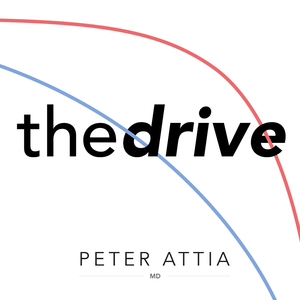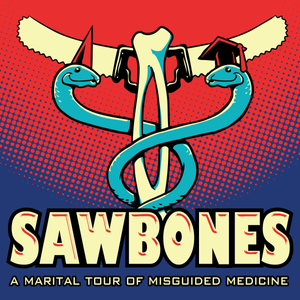
#250 ‒ Training principles for longevity | Andy Galpin, Ph.D. (PART II)
04/10/23 • 166 min
5 Listeners
View the Show Notes Page for This Episode
Become a Member to Receive Exclusive Content
Sign Up to Receive Peter’s Weekly Newsletter
Andy Galpin is a Professor of Kinesiology at California State University at Fullerton, where he studies muscle adaptation and applies his research to work with professional athletes. In this episode, Andy returns to the podcast and continues the conversation about training for longevity. He examines the training practices of powerlifters, Olympic weightlifters, Strongmen/women, CrossFit athletes, and sprinters in order to extract insights that can be applied to the individual wanting to optimize for longevity. Andy goes into detail about exercise load and repetition, training volume, the importance of learning proper movement patterns, the advantage of working to technical failure instead of the number of reps, and much more. Andy ties the discussion together by providing a hypothetical training plan for an individual wanting to optimize for longevity and offers advice for avoiding injury.
We discuss:
- Review of the function and organization of skeletal muscle [3:15];
- Review of muscle fiber types [9:30];
- Hypertrophy: changes in muscle fibers and the underlying mechanisms that make a muscle grow [19:30];
- Defining sarcoplasmic hypertrophy and how it relates to the number of reps in a set [30:15];
- Training for maximum strength: what we can learn from powerlifters and a hypothetical training plan [32:45];
- Ideal reps, volume, and load for the powerlifter [44:45];
- What should powerlifters do on their off days? [56:45];
- Are there consequences of powerlifting on long-term health? [1:02:00];
- Defining Olympic weightlifting: a test of power [1:04:30];
- Training principles of Olympic weightlifting [1:07:45];
- Tracking power output when training [1:17:15];
- Frequency of training for Olympic weightlifting [1:22:15];
- How post-activation potentiation (and the opposite) can improve power training and speed training [1:24:30];
- The Strongman competition: more breadth of movement, strength, and stamina [1:32:00];
- Training principles of Strongmen and advice for someone new to the Strongman competition [1:36:45];
- CrossFit: a combination of weightlifting movements, endurance, and circuit training [1:50:15];
- Learning from elite athletes, heart rate recovery, V02 max, and other metrics [1:58:45];
- Optimizing towards being a well-rounded athlete as opposed to a specialist [2:09:45];
- What we can learn from the sprinters about speed, acceleration, peak velocity, and technique [2:17:45];
- A training plan for the “centenarian athlete” [2:24:30];
- Debunking some training and exercise myths [2:33:00];
- The “do nots” of training and tips for avoiding injury [2:34:15]; and
- More.
Connect With Peter on Twitter, Instagram, Facebook and YouTube
View the Show Notes Page for This Episode
Become a Member to Receive Exclusive Content
Sign Up to Receive Peter’s Weekly Newsletter
Andy Galpin is a Professor of Kinesiology at California State University at Fullerton, where he studies muscle adaptation and applies his research to work with professional athletes. In this episode, Andy returns to the podcast and continues the conversation about training for longevity. He examines the training practices of powerlifters, Olympic weightlifters, Strongmen/women, CrossFit athletes, and sprinters in order to extract insights that can be applied to the individual wanting to optimize for longevity. Andy goes into detail about exercise load and repetition, training volume, the importance of learning proper movement patterns, the advantage of working to technical failure instead of the number of reps, and much more. Andy ties the discussion together by providing a hypothetical training plan for an individual wanting to optimize for longevity and offers advice for avoiding injury.
We discuss:
- Review of the function and organization of skeletal muscle [3:15];
- Review of muscle fiber types [9:30];
- Hypertrophy: changes in muscle fibers and the underlying mechanisms that make a muscle grow [19:30];
- Defining sarcoplasmic hypertrophy and how it relates to the number of reps in a set [30:15];
- Training for maximum strength: what we can learn from powerlifters and a hypothetical training plan [32:45];
- Ideal reps, volume, and load for the powerlifter [44:45];
- What should powerlifters do on their off days? [56:45];
- Are there consequences of powerlifting on long-term health? [1:02:00];
- Defining Olympic weightlifting: a test of power [1:04:30];
- Training principles of Olympic weightlifting [1:07:45];
- Tracking power output when training [1:17:15];
- Frequency of training for Olympic weightlifting [1:22:15];
- How post-activation potentiation (and the opposite) can improve power training and speed training [1:24:30];
- The Strongman competition: more breadth of movement, strength, and stamina [1:32:00];
- Training principles of Strongmen and advice for someone new to the Strongman competition [1:36:45];
- CrossFit: a combination of weightlifting movements, endurance, and circuit training [1:50:15];
- Learning from elite athletes, heart rate recovery, V02 max, and other metrics [1:58:45];
- Optimizing towards being a well-rounded athlete as opposed to a specialist [2:09:45];
- What we can learn from the sprinters about speed, acceleration, peak velocity, and technique [2:17:45];
- A training plan for the “centenarian athlete” [2:24:30];
- Debunking some training and exercise myths [2:33:00];
- The “do nots” of training and tips for avoiding injury [2:34:15]; and
- More.
Connect With Peter on Twitter, Instagram, Facebook and YouTube
Previous Episode

#249 ‒ How the brain works, Andrew’s fascinating backstory, improving scientific literacy, and more | Andrew Huberman, Ph.D.
View the Show Notes Page for This Episode
Become a Member to Receive Exclusive Content
Sign Up to Receive Peter’s Weekly Newsletter
Andrew Huberman is a Professor of Neurobiology at Stanford University and host of the Huberman Lab podcast. In this episode, Andrew begins with a fascinating discussion about the brain, including the role of the prefrontal cortex in adjusting your ruleset to match your setting, the neural circuitry underlying the ability of stress to limit creativity and problem-solving, the effect of belief on physiology and performance, and more. He speaks about vision being our “superpower” and compares this to animals that rely more on other senses. Next, he opens up about his personal journey, the struggles and losses he has overcome, the value of therapy, and the many great people who helped him along the way. He speaks to his love of biology and discovery and the importance of staying true to your passion rather than being driven purely by ambition. Lastly, the conversation includes a look to the future of Andrew's scientific work and podcast as well as his unique approach to communicating science and tackling the issue of scientific illiteracy.
We discuss:
- Exercise under blood flow restriction, lactate utilization, and transient changes in the brain function in response to adrenaline and stress [3:30];
- The role of the prefrontal cortex in governing rulesets [9:15];
- New discoveries about the circuitry between the prefrontal cortex, insula, and amygdala, and the insights gleaned about brain function in different emotional states [15:30];
- Comparing human vision and other senses to animals [26:00];
- A deep dive into vision: evolutionary adaptations, facial recognition, color, and more [39:45];
- Sense of smell, pheromones, and why evolution developed better vision over smell [46:30];
- The relationship between visual input and time perception [55:30];
- Mindset effects: the effect of belief on physiology and performance [1:00:45];
- Accessing higher levels of creativity with broadening rulesets and the limiting nature of stress and fear on creativity [1:05:30];
- Stress and fear increase autonomic arousal, limit access to rulesets, and inhibit performance [1:12:15];
- Andrew’s upbringing, early childhood, and tough adolescent years [1:15:00];
- Andrew’s time in a residential treatment program and how he benefited from therapy [1:20:15];
- The beginning of positive changes in Andrew’s young life [1:28:30];
- Andrew’s decision to turn his life around [1:37:00];
- A new passion for science and exercise helps Andrew [1:42:00];
- The difference between a postdoc and a PhD [1:54:15];
- Staying in touch with the love of biology and not getting pulled into ambition [1:59:15];
- Andrew starts his own lab, and continues work to overcome his demons [2:07:00];
- The loss of three mentors leads to deep soul searching [2:12:00];
- What motivated Andrew to begin his podcast [2:18:00];
- Looking to the future of Andrew’s scientific work, podcast, and more [2:22:45];
- Andrew’s unique approach to communicating science and the issue of scientific illiteracy [2:30:00]; and
- More.
Connect With Peter on Twitter, Instagram, Facebook and YouTube
Next Episode

#251 - AMA #46: Optimizing brain health: Alzheimer's disease risk factors, APOE, prevention strategies, and more
View the Show Notes Page for This Episode
Become a Member to Receive Exclusive Content
Sign Up to Receive Peter’s Weekly Newsletter
In this “Ask Me Anything” (AMA) episode, Peter goes into depth on the topic of brain health, starting with how Alzheimer's disease is diagnosed, the significance of blood-based biomarkers in diagnosis, and what the various APOE gene variants mean in terms of a person's risk of developing Alzheimer's disease. Next, Peter discusses the various strategies for preventing Alzheimer's disease and neurodegeneration. He touches briefly on exercise as a potent tool, but focuses more on lesser-known factors that could impact brain health, such as nutrition supplementation, lipid management, brain games, sauna, oral health, hearing loss, and more.
If you’re not a subscriber and are listening on a podcast player, you’ll only be able to hear a preview of the AMA. If you’re a subscriber, you can now listen to this full episode on your private RSS feed or our website at the AMA #46 show notes page. If you are not a subscriber, you can learn more about the subscriber benefits here.
We discuss:
- Diagnosing Alzheimer's disease [2:45];
- Biomarkers for Alzheimer’s disease, the C2N test, and other tools for diagnosis [7:30];
- Genetic component of Alzheimer’s disease: genes that confer risk [12:45];
- Understanding your APOE status and why it’s important to know [17:15];
- The prevalence of Alzheimer’s disease and other forms of dementia, and who is at higher risk [21:15];
- Can the risk of Alzheimer’s disease be decreased with behavioral changes? [24:15];
- Overview of modifiable behaviors that potentially play a role in risk reduction of neurodegeneration [30:15];
- Things that clearly impact brain health: smoking, alcohol, sleep, head injuries, blood pressure, and more [34:15];
- How nutrition impacts brain health: common diets, metabolic health, energy balance, and more [46:15];
- Comparing common diets: data showing the association between the incidence of Alzheimer’s disease and specific diets [59:45];
- Supplements: EPA and DHA, vitamin D, and B vitamins [1:13:00];
- Supplements: theracurmin, cocoa flavonols, and magnesium L-threonate [1:25:15];
- Impact of exercise on brain health, minimum effective dose, and the most important types of exercise [1:33:00];
- Challenging the mind with brain games—does it impact neurodegeneration? [1:43:00];
- The data on sauna and brain health [1:49:45];
- Oral health and its association with brain health [1:52:45];
- How reducing lipids can improve brain health and prevent neurodegeneration [1:55:30];
- The potential impact of hearing loss on brain health and neurodegeneration [2:04:30]; and
- More.
Connect With Peter on Twitter, Instagram, Facebook and YouTube
If you like this episode you’ll love
Episode Comments
Featured in these lists
Generate a badge
Get a badge for your website that links back to this episode
<a href="https://goodpods.com/podcasts/the-peter-attia-drive-22593/250-training-principles-for-longevity-andy-galpin-phd-part-ii-29203525"> <img src="https://storage.googleapis.com/goodpods-images-bucket/badges/generic-badge-1.svg" alt="listen to #250 ‒ training principles for longevity | andy galpin, ph.d. (part ii) on goodpods" style="width: 225px" /> </a>
Copy




